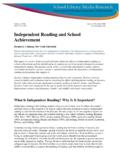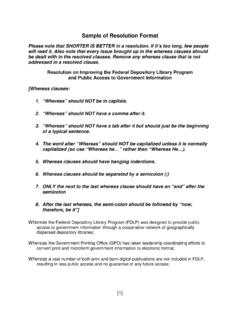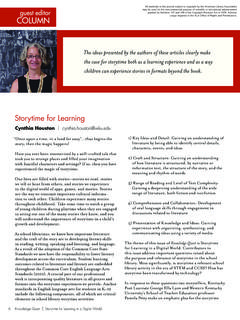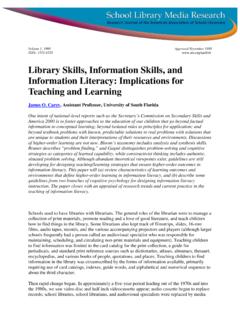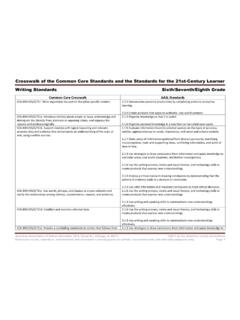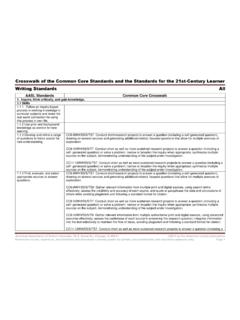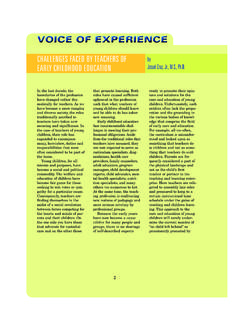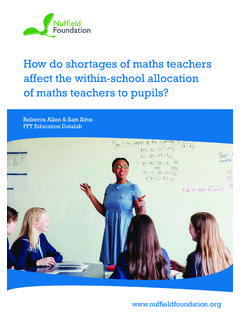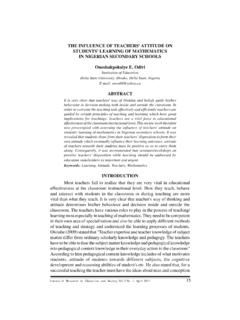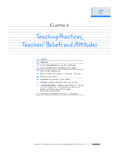Transcription of www.ala.org/aasl/slr Preparing Teachers and …
1 Volume 16, 2013 Approved April 4, 2013. ISSN: 2165-1019 Preparing Teachers and librarians to Collaborate to Teach 21st Century Skills: Views of LIS and Education Faculty Don Latham, Associate Professor, School of Library & Information Studies, Florida State University Melissa Gross, Professor, School of Library & Information Studies, Florida State University Shelbie Witte, Assistant Professor, School of teacher Education, Florida State University Abstract This article discusses the results of an exploratory research project in which library and information studies (LIS) faculty and education faculty were asked about their views on teaching pre-service school librarians and Teachers 21st Century Skills (as defined by the Partnership for 21st Century Skills) and librarian- teacher collaboration.
2 Researchers used a case-study approach to investigate and compare the views and experiences of LIS faculty and education faculty at a research institution. Participants indicated their sense of which skills were taught in each discipline. In addition, they described their own experiences in collaborating with Teachers and/or librarians , as well as their views on where collaboration was taught in their respective curricula, where it could be taught, and how it might be taught most effectively. Findings indicate that while education faculty members tend to have a broader view of LIS than do LIS. faculty and see education and LIS as having largely overlapping concerns, collaboration is more likely to be a topic of discussion in LIS classes than in education classes.
3 Faculty in both disciplines acknowledged that, while collaboration is desirable, it is often difficult to achieve in practice. Introduction While the library and information science (LIS) literature touts collaboration with Teachers as a way for school librarians to contribute to the overall educational mission of their institutions, evidence suggests that achieving successful collaborative relationships in the field is fraught with challenges (Hartzell 1997; Lance 2010; Miller and Shontz 1993; Williams 1996). This circumstance raises several important questions. In their pre-service studies, to what extent are Teachers and school librarians being taught to collaborate? Does the extent vary between LIS and education courses?
4 While students are in training, do they have opportunities in both disciplines to foster a culture of collaboration that will extend to their practices in the field? Preparing Teachers and librarians to Collaborate Volume 16 | ISSN: 2165-1019. This article discusses the results of an exploratory research project in which members of the LIS. and education faculties were asked about their views on teaching pre-service librarians and Teachers 21st Century Skills (defined in this context as thinking, learning, technology, and information-literacy, life, and career skills essential for success in this century; more below) and librarian- teacher collaboration. Researchers used a case-study approach to investigate the views and experiences of members of the LIS and education faculties at a research institution.
5 Participants indicated their sense of which skills were taught in each discipline. In addition, they described their own experiences in collaborating with Teachers and/or librarians , as well as their views on where collaboration was taught in their respective curricula, where it could be taught, and how it might be taught most effectively. Findings indicate that while education faculty tend to have a broader view of LIS than do LIS faculty and see education and LIS as having largely overlapping concerns, collaboration is more likely to be a topic of discussion in LIS classes than in education classes. Faculty in both disciplines acknowledged that, while collaboration is desirable, it is often difficult to achieve in practice.
6 The issue is an important one for several reasons. Increasing emphasis is being placed on student learning outcomes, student performance on standardized tests, and accountability of schools and Teachers . In particular, the focus on helping students acquire specific skill sets needed for life and work can be seen in such initiatives as the Partnership for 21st Century Skills ( ) and the Common Core State Standards (NGACBP and CCSSO 2012), both of which are discussed below. Developing collaborative partnerships between Teachers and school librarians is one way of addressing these educational mandates. Given the complexity of what schools are expected to achieve, it may be unrealistic to think that one teacher in one class can do it all.
7 Related Literature In considering the potential role of teacher -librarian collaboration in promoting the acquisition of 21st Century Skills among students, it is necessary to examine the literature on teacher -librarian collaboration and the literature on 21st Century Skills. Considerably more attention is given to teacher -librarian collaboration in the LIS literature than in the education literature, whereas the interest in 21st Century Skills is evident in the literature of both disciplines. teacher -Librarian Collaboration In Empowering Learners: Guidelines for School Library Programs, the American Association of School librarians (AASL) has emphasized the role of collaboration: The school library program promotes collaboration among members of the learning community and encourages learners to be independent, lifelong users and producers of ideas and information (2009, 19).
8 While the focus here may be on students as learners, the learning community referenced also includes Teachers and school librarians as key players. The education literature contains reports of studies on teacher - teacher collaboration. Cynthia A. Lassonde and Susan E. Israel (2010), for example, have argued for the benefits of establishing collaborative learning communities among Teachers . Cordie E. Wimberley (2011) has reported on a positive correlation between effective collaboration by Teachers and students' scores on achievement tests. Also, Roni Jo Draper (2008), a content-area literacy teacher , has described her successful collaboration with content- area specialists through an action-research project.
9 Interestingly, in the education literature teacher -librarian collaboration has received far less attention than has teacher - teacher collaboration. 2 School Library Research | Preparing Teachers and librarians to Collaborate Volume 16 | ISSN: 2165-1019. teacher -librarian collaboration, does, however, appear in the LIS literature. Reports of school librarians successfully collaborating with Teachers abound in the LIS literature, including reports of collaboration to implement 21st Century Skills education (for example, see McGriff 2012;. Schmidt, Kowalski, and Nevins 2010; Schultz-Jones 2010; O'Sullivan and Dallas 2010). Some research projects, such as Violet H. Harada's (2001) professional development course, have brought Teachers and school librarians together to learn and practice collaboration skills.
10 As early as 2002, Ruth Small reported on the efforts at Syracuse University to bring together faculty from LIS and faculty from education to develop effective educational programs for pre-service librarians and Teachers . Through a series of projects, Patricia Montiel-Overall developed a model of teacher -librarian collaboration (2008; 2010). This model can apply in various subject areas. Elsewhere, Montiel-Overall (2012) has argued that Teachers and librarians can collaborate to develop lesson plans to teach such global issues as globalization, ecology, technology, and policy. In addition, Patricia Montiel-Overall and Kim Grimes (2013) reported on how Teachers and school librarians have collaborated to develop inquiry-based science lessons for Latino elementary school students.
